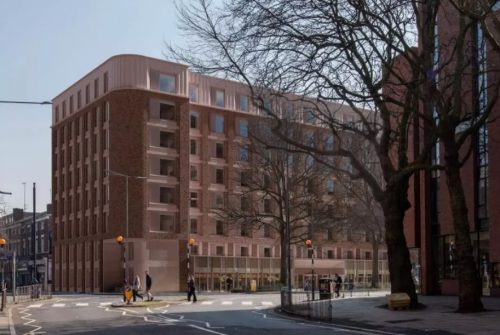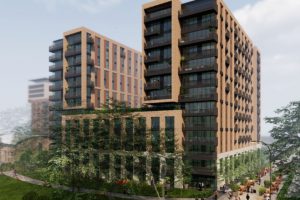Key accommodation schemes earmarked for approval face stern opposition

Liverpool City Council planning committee has been recommended to approve two key schemes, one which was previously rejected by councillors, at next week’s meeting (January 30).
One proposal is for the demolition of a two storey building which was purpose-built in 1932 as a roller skating rink, known as the Ritz Roller Rink, on Mulberry Street in L7, and create an eight-storey, 242-bedroom student accommodation building, put forward by McClaren Property.
A second scheme is for a 261-apartments scheme on Liverpool’s waterfront, which was rejected unanimously by councillors last month due to the lack of affordable housing and issues over S106 payments.
The Mulberry Street site is currently used as a furniture shop and café/frozen yogurt shop to the ground floor. The upper floor is vacant. An adjacent building is a former Avis car hire garage with associated forecourt canopy. This was built in the post-war period and is comparable in height to the former roller rink. It has been vacant and in a state of disrepair for a number of years.
McLaren’s plans are for 77 studios (32%), 32 cluster units providing 165 bedspaces (68%). Five per cent of bedrooms are accessible to M4(3) standard across the development in both studios and cluster bedrooms. The scheme has been designed by Manchester-based Cartwright Pickard.
Communal areas to the ground floor include a reception, student hub, laundry, cycle parking, refuse storage area and sub-station. The scheme does not include any car parking, although 81 cycle spaces are to be provided.
One letter of support for the scheme from a neighbour was submitted, but it has attracted 56 objections, including concerns over the design, scale, massing and impact of proposed building, and the principle of student accommodation. Two local councillors, Cllr Nathalie Nicholas and Cllr Tom Logan have also registered their opposition.
However, in recommending approval for the development, planning officers say: “It is accepted that the proposed development will result in some harm to designated heritage assets.
“As this is considered to be less than substantial, however, the harm has been weighed against the public benefits of the proposal. In this instance and on balance, it is considered that the public benefits outweigh this harm and that the proposed development will enable the regeneration of a long term underused and partly unsightly site within the Canning Street Conservation Area and will have a positive impact on the area.”
Another proposal coming before the committee has, again, been approved by planning officers.

Carpenter Investments scheme (via planning docs)
Last month Liverpool-based Carpenter Investments submitted the plans for a stepped building, rising from 11 to 13 storeys, with a five-storey podium fronting onto the main Wapping highway, including one floor of office and commercial spaces, on land between Kings Dock Street and Sparling Street, at the eastern edge of the Baltic Triangle.
The proposed site, described as “neglected”, comprises 2.6 hectares, including a former surface car parking area which had been unused for a number of years but has recently been used for building material storage.
The developer is seeking permission to create 261 apartments on the first to 12th floor levels of the 13-storey scheme, offering 104 one-bedroom units, 71 two-bedroom, 65 two-bedroom duplex units, 11 three-bedroom, and 10 three-bedroom duplex units.
An amendment by Cllr Steve Radford, seconded by Cllr Pat Moloney, that the application be refused based on the design and scale of the development; failure to comply with policy requirements in respect of affordable housing; and failure to comply with policy requirements in respect of planning obligations, was carried and the subsequent vote resulted in unanimous rejection.
Planning officers have, again, recommended approval. But if councillors reject the scheme, it could lead to an appeal and costs being awarded against the council.
So, planning officers have suggested three reasons for refusal, in that the building would be too dominant because of its height, the lack of affordable housing, and not enough open space has been provided.








